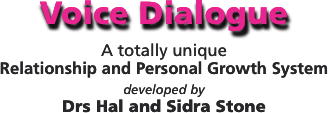Issue 30
THE THIRD ELEMENT
THE CONSCIOUSNESS MODEL
A New Definition of Consciousness
The old forms didn’t quite work for us. We knew that we needed something new, but weren’t quite sure what it was. We remember driving across a great flat valley wondering aloud about just what it could be that would be beyond the selves and take charge of life; and what we could do to bring in the spiritual dimension. We tried and tried, but nothing gave us what we were seeking. That had to wait.
Finally, we looked at the term “Ego”. The Ego has always been seen as the directing agent of the personality and it is an excellent term – one with a long history. It is often described as the executive function of the psyche. It is the “I” that we refer to when we talk about ourselves.
What we began to realize was that this all-powerful Ego is, in fact, a group of primary selves that together run our lives and rule the personality without anyone knowing it. It can be the Rational Mind, the Pusher, the Pleaser, the Responsible Parent, the Independent One, the Rebel – it is whatever it is that we think we are – it is whichever selves are running our lives. We decided to call this group of selves – the traditional Ego – the “Operating Ego”.
Then we had to develop a new name to described what happened in Voice Dialogue when we separated from a primary self and returned to center. That center space was no longer occupied by the Operating – or traditional – Ego. The new term we used was the Aware Ego. We found that this Aware Ego process evolves and gets stronger and stronger with continuing work. What became increasingly clear to us was that the Operating Ego is here forever but it gradually surrenders power to the Aware Ego process as we separate from more and more primaries and integrate more and more disowned selves.
Now a new way at looking at consciousness began to emerge.
We saw three levels to the process of consciousness.
First there was the level of Awareness. This has been around for a very long time. It is often referred to as the witness state in meditation. It gives us the ability to step back and see the big picture. It does not act. It is not attached to outcome.
The second level of consciousness we began to see as the actual experience of the selves, the experience of life itself. Awareness does not experience. It witnesses. Awareness without experience isolates us from life. Experience without awareness keeps us locked into the animal kingdom. Both are essential to an ongoing consciousness process.
Then there was the new kid on the block. Someone has to live our lives; someone has to drive the car. Someone has to use the gift of awareness and the treasure of experience and, for us, that someone or something was the Aware Ego or, more accurately, the Aware Ego process. We realized that this was an ongoing dynamic process that was always changing, that there was no such thing as an Aware Ego.
As a matter of fact, over the years we have come to see that consciousness itself is a process – with each of the three levels of consciousness representing a distinct, individually evolving process.
HONORING THE PRIMARY SELVES
We were learning a great deal about primary selves in those early years and the learning has never stopped. There is one thing that we understood from the beginning that has stood us in good stead all through the years. One must always honor the primary self. In the practice of Voice Dialogue this is probably one of strongest recommendations we can make. The primary self is the ally of the facilitator. Both have the interests and wellbeing of the client at heart and there must be a mutual respect and deep understanding between the primary selves and the facilitator.
What we learned early in the practice of Voice Dialogue has yet deeper and more far reaching implications for living life. We are always dealing with people and essentially we are always dealing with their primary selves. Knowing this can save us much unhappiness.
Many years ago, very early in our work together, we were at a social gathering and a rather traditional psychologist asked us about our work. Not yet truly appreciating how important it was to honor the primary selves in the “real world”, we opened up to him and shared our ideas and work. He became very judgmental as he aggressively questioned us about the empirical basis for our work and wanted to know exactly what kinds of experiments we had designed and carried out. He accused us of making up these selves and made some vague threats about malpractice. All in all, it was a very unpleasant experience.
We are fast learners and we learned from this experience to feel into people more carefully and to explore the nature of their primary selves before we shared our ideas and feelings. We have tried our best not to share our work with people who are not ready to listen. As we’ve often said, “We go only where the door is already open.” After this experience, we were much more cautious. We began to screen invitations to speak and, before we spoke with a new group, we did our best to determine the nature of the primary self system that dominated that particular group, clinic or center. This kind of sensitivity was particularly important when we were working in other cultures. It’s important to know the rules, and to use language and concepts that do not polarize the primary selves. This attention to the primary selves in our surroundings has saved us untold discomfort – both professionally and personally.

